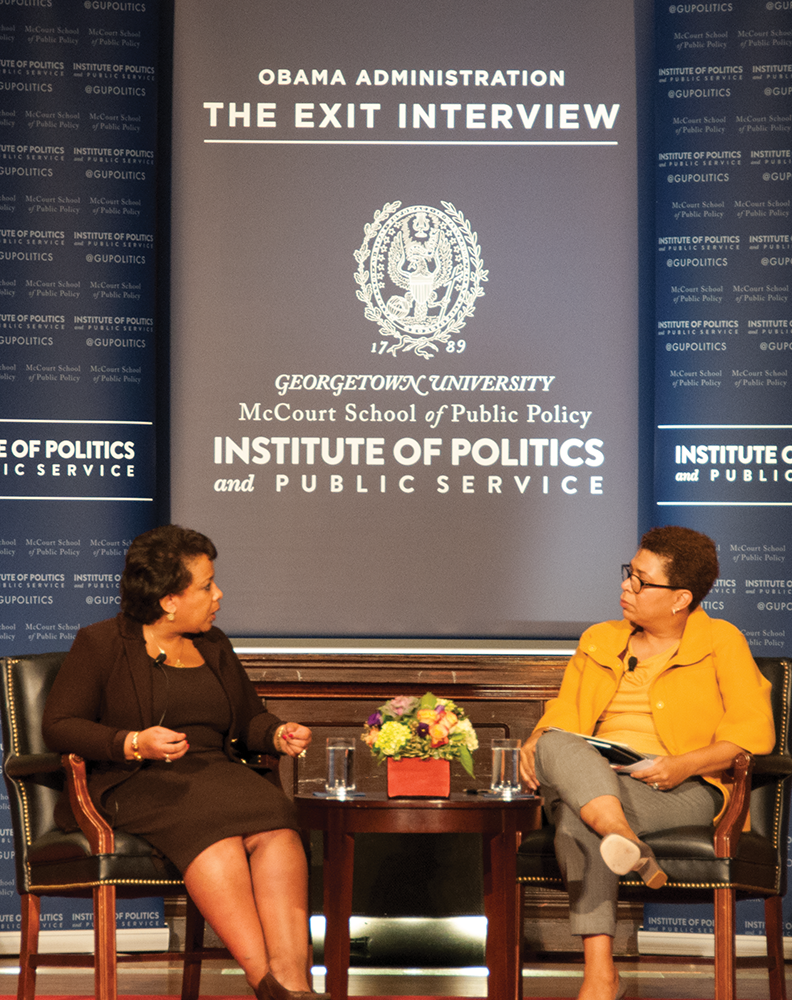
U.S. Attorney General Loretta Lynch discussed a national data collection program in her “Exit Interview.”
U.S. Attorney General Loretta Lynch expressed her support for a recently announced program that will collect information on the lethal use of police force as well as create the first national database for lethal and nonlethal interactions in Gaston Hall yesterday.
The speech marked the first time Lynch publicly announced her support for the National Use of Force Data Collection Program, which is a joint project by the Justice Department and the Federal Bureau of Investigation that was launched Oct. 5.
Transparency between the police and the communities they serve will increase with the program, according to Lynch.
“One of the things that we want to know is that when we do see a situation where, in one part of a country or another, there is a police department that is seeing a rise in complaints among civilians about the way they are treated at traffic stops,” Lynch said. “You want to know how that’s compared to last year or the year before. What’s going on that’s leading to this?”
Lynch addressed the project in part of the second of the Georgetown Institute of Politics and Public Service’s six “exit interviews,” a programming series that focuses on President Barack Obama’s legacy as he reaches the conclusion of his second term.
GU Politics, which is part of the McCourt School of Public Policy, previously hosted National Security Advisor Susan Rice on Sept. 14 in an event focusing on national security as the first of its six-part series.
Moderated by Michel Marton, the weekend host of National Public Radio’s “All Things Considered,” said the Thursday discussion centered on modern policing and community relations in light of the national conversation surrounding the excessive use of force by law enforcement officials.
The National Use of Force Data Collection Program will focus on analyzing the effectiveness of the data collection methodology and quality, as well as requiring local, state, tribal and federal law enforcement agencies to report incidents of lethal police force, under penalty of noncompliance fines. However, the Justice Department cannot mandate state and local agencies to report on nonlethal interactions; its participation in this section of the program is voluntary.
The Justice Department plans to begin collecting data early next year.
University President John J. DeGioia introduced Lynch by discussing the importance of promoting justice and working toward public service on a university campus.
“Understanding and exploring ideas of justice has a strong resonance with any university, whether through the formation of our students, in the inquiry of our faculty or in the responsibility that we have in promoting the common good,” DeGioia said. “It is the ethos, the characteristic spirit of a university, to seek those matters, to work and build a more just, fair and inclusive society.”
Lynch cited the poor relationship between police officers and the communities they serve as one of the biggest challenges to the Obama administration’s legacy.
“In every community that I go into, and I’ve been a prosecutor for 20 years, people want to have good relations with law enforcement because no one wants to feel that when you are in harm’s way, you have nobody to call,” Lynch said. “That is the upshot of what we’re seeing in communities. People are feeling targeted, and people are feeling that there is nowhere there for them. There’s no one in their corner.”
Lynch also said conversations on the issue are important because they serve as a way to acknowledge the claims of both minority and police communities and to find common ground between both groups.
“I think it’s an opportunity to honor the deaths of civilians and law enforcement officers and to acknowledge that law enforcement have an incredibly difficult and dangerous job, but at the end of the day both law enforcement and civilians have the same goal: to get home alive and to live in a safe community,” Lynch said.
Lynch called the Obama administration’s work on LGBTQ issues its greatest success, specifically citing marriage equality and legal protections for families with same-sex parents.
“You cannot have a country, even when it’s as great as ours, live up to its ideals and what it stands for if you are deliberately excluding a huge class of people who want one of the most basic and fundamental rights we have, and that’s the right to marry,” Lynch said. “The way in which this administration has been able to work on the issue is one of the great points of pride and for me. We are measured by how we treat people that others want us to exclude and push or hold back.”
Kelly Bies (GRD ’18), who previously taught middle school in Chicago, reflected on how she witnessed firsthand the impact of the Obama administration’s policies.
“I think her opinions on criminal justice and social justice are really interesting,” Bies said. “I’m a former teacher, so it’s amazing to see how these policies impact our lowest-income communities and the students in them.”




















